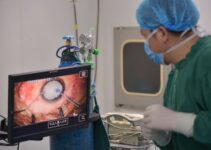In the United States, toilets are being developed that can analyze urine and stool to detect health problems. These toilets can be connected to an application that can alert the user if an anomaly has been detected in their urine and stool.

Toilet
Are Intelligent toilets, the future of healthcare?
About a year ago, the startup Heart Health Intelligence announced that it created a toilet seat that can detect congestive heart failure. A few months ago, scientists from the University of Wisconsin announced that they were building an intelligent toilet that can analyze urine and monitor an individual’s health in real-time. Recently, Stanford University scientists announced that they have a similar design in their pipeline and the design is beginning to take shape as they have already tested these super toilets on 21 subjects. Their research was published in the April 6th edition of Nature Biomedical.
“Our concept goes back over 15 years,” explains Professor Sam Gambhir in a press release on the university’s website. When I told them that, they laughed at me because it was a funny idea, but still a little strange one.” So the scientists developed a toilet with a technology that can analyze the samples of the user in the bowl. The urine samples are subjected to physical and molecular analysis, but the fecal evaluation so far is based only on physical characteristics.
The toilet bowl automatically sends the data through a secure online system. The data is then processed using a number of algorithms that can distinguish normal “urodynamics” (within parameters such as flow rate, travel time, and total volume) and also any unhealthy fecal consistency.
We all use the bathroom
These super toilets also use urine test strips to measure specific molecular properties, because “white blood cell count, constant blood contamination, a certain level of protein and other parameters can indicate different diseases, from infection to bladder cancer and kidney failure,” scientists explain. Currently, 10 biomarkers can be measured in the toilet.
“The thing about a smart toilet, though, is that, unlike wearables, you can’t take it off,” says Sam Gambhir. And because we all have to go to the bathroom the device makes a great diagnostic tool.
The technology that makes the smart toilet possible is embedded in a traditional porcelain bowl. The intelligent toilet is outfitted with small extensions that can perform various functions.
But what might scare away the consumers is the integrated identification system .” The aim was to provide accurate and personalized health feedback, so we had to make sure that the toilets were able to identify users. “says Sam Gambhir. That’s why we made a toilet flushing lever that can read fingerprints. To further increase reliability, the company says they also added a small scanner to the toilet to identify hard-to-reach body parts. We know it sounds weird, but it turns out that our anal prints are unique,” says Sam Gambhir, who reiterated that the toilet is not a substitute for a conventional doctor visit.
Individualized tests
In practice, the sensors don’t send data directly to the patient.” In an ideal scenario, if something suspicious happens, such as blood in urine, the privacy-respecting application sends a warning to the user’s medical team so that a specialist can determine what steps need to be taken to make a correct diagnosis. The data will be stored in a secure, web-based system’. – stated the scientists.
For those who are worried about how their health data might be used, Mr. Gambhir wants to reassure them.” We have taken strict steps to ensure that all information is encrypted when it is sent to the cloud and that it is protected under HIPAA [when it is sent to healthcare providers]”. explained the researchers.
Currently, the scientists are trying to increase the number of participants. The company is also trying to add molecular analysis for the stools and to improve currently used diagnosis technologies. Finally, in the long run, they want to be able to customize tests based on the needs of each individual. For example, a diabetic may need to check his or her urine glucose levels more often and a person with a predisposition to bladder or kidney cancer may need a toilet that can check for blood in their urine.
References
https://med.stanford.edu/news/all-news/2020/04/smart-toilet-monitors-for-signs-of-disease.html
FEEDBACK:



